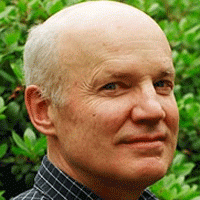Betty Freyhof Johnson ’44 Professor Emeritus of Political Science
Researcher on food and agricultural policy, with a focus on farming technologies and poverty in the developing world.
After 39 years at Wellesley College, Prof. Rob Paarlberg retired at the end of the 2014-15 academic year.
Watch his last lecture here.
I do most of my research and consulting in the area of international food and agricultural policy, especially in Africa and the developing world. This topic connects me both to my own family history (my father grew up on a farm in Indiana) and to an important current issues in international development: How to help farmers in Africa – most of whom are women – increase their productivity to better feed their families and escape poverty. In the past decade I have worked in more than a dozen countries in Africa, supported by the Bill and Melinda Gates Foundation, the International Food Policy Research Institute, and the United States Agency for International Development. My 2008 book from Harvard University Press (Starved for Science: How Biotechnology is Being Kept Out of Africa) has a foreword by two Nobel Peace Prize winners, Jimmy Carter and Norman Borlaug. My current research examines the impact of international trade on agricultural land use.
In recent years, my students at Wellesley have taken an increased interest in issues of food and farming around the world. They want to know what kinds of food and farm systems can provide not just increased production, but social justice, improved nutrition, and environmental sustainability as well. I address these questions in a senior seminar I teach every year, and in 2010 I will publish a new book from Oxford University Press (Food Politics: What Everybody Needs to Know) based on the materials developed in this seminar. I also teach two large international relations courses every year, one on international economic policy and the other on “theories” of United States foreign policy. In addition, I teach the introductory course in our department, which showcases eight important books written by political scientists, from Machiavelli to the present.
My work on international agriculture engages me with a wide variety of audiences beyond the academic world. In the past year I have given talks to the executive leadership of the Mars Candy Company (on cocoa, in Africa), to the Pontifical Academy of Sciences in Rome (on agricultural technology), and to a conference on African farming in Uganda. In addition, I gave testimony in 2009 to the Senate Foreign Relations Committee, on U.S. agricultural development assistance policy. Most interesting to me, however, are the visits I make to farms and farmers in the developing world, where a combination of bad history and bad current policy have held too many people in poverty for too long.
In the summer months, between work and travel, I enjoy retreating with my wife Marianne to our place on the coast of Maine, where there is plenty of hiking, biking, swimming, fishing, boating, golfing, and picture taking to do, and where the lobsters always taste good.

